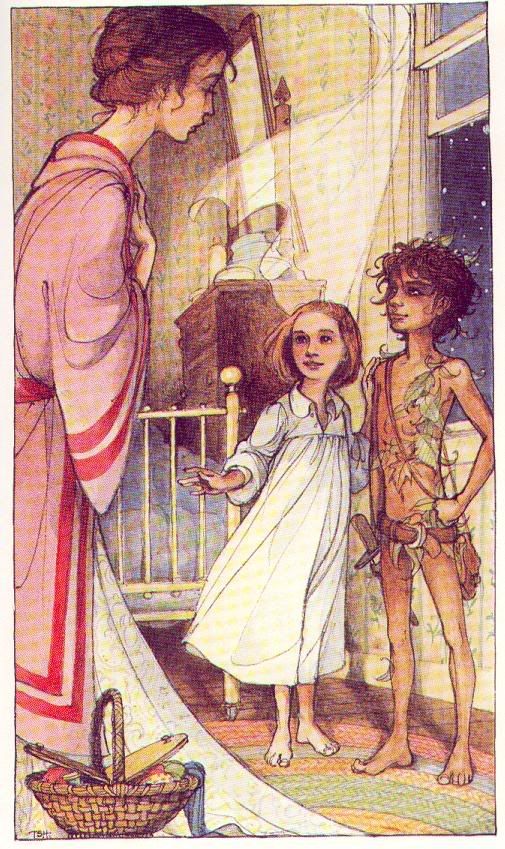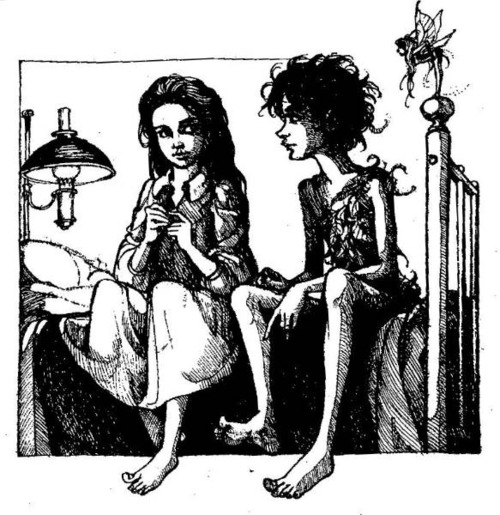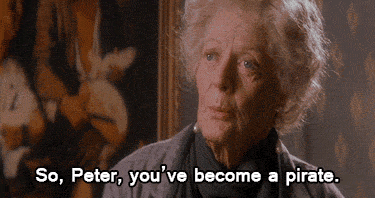“Wendy," Peter Pan continued in a voice that no woman has ever yet been able to resist, "Wendy, one girl is more use than twenty boys.”
― J.M. Barrie, Peter Pan
 |
| Trina Schart Hyman 1980 |
Women play a very significant and valuable role in J.M. Barrie's Peter Pan, but they are seldom described as the characters who drive the story. This in my opinion is because of the aggressive notion of pirates and battle, Captain Hook and Peter Pan. Many facets and strengths of the feminine spirit are the driving forces behind this tale.
 |
| F. D. Bedford, Peter Pan 1911 UK Edition |
 |
| Peter Pan in Kensington Gardens, Arthur Rackham 1906 |
Tinker Bell is the beloved fairy companion of Peter Pan described as a pixie. Pixies in literature are often seen as pranksters, they are the one's responsible for the chaos in William Shakespeare's A Midsummer Nights Dream. She is wild by nature and at times has a quick ill temper. In the novel she also displays great courage and kindness. It is explained by J.M. Barrie that her body is so small that it can only hold one emotion at a time. Her jealousy shines in a moment when she convinces the Lost Boys to shoot at Wendy with their bow and arrows. Tinker Bell's greatest moment on stage and in the novel is when she consumes a bottle of poison. The poison is cleverly placed in Peter's secret dwelling by Captain Hook disguised as a bottle of medicine. Peter picks up the bottle and tries to drink it in an effort to appease Wendy. With no time to waste and quick courage Tink snatches the bottle from Peter and drinks it, an act of selflessness that nearly claims her life. This is the famous moment in J. M. Barrie's play when Peter turns to the audience and asks for help expressing that the belief in fairies could save her life. On the stage Tinker Bell traditionally appears as a bright light, which is ironic because she could easily be described as a guiding light in Neverland. In one of the most creative adaptations of Peter Pan, Steven Spielberg's Hook it is suggested that she guided Peter to Neverland after saving him when he ran away to Kensington Gardens. In both the play and the novel it is her 'Pixie Dust' that guides the Darling children to Neverland and in the climax of the novel she acts as Peter's guardian angel by saving his life. It is interesting to note that the smallest figure in this story is a female who made just about everything possible.
 |
| Trina Schart Hyman 1980 |
“..children know such a lot now, they soon don't believe in fairies, and every time a child says, 'I don't believe in fairies,' there is a fairy somewhere that falls down dead.”
― J.M. Barrie, Peter Pan
 |
| Julia Roberts, Hook 1991 |
Hook stands alone as one of the greatest fantasy films simply because of it's faithful depiction of Neverland. The film somehow manages to capture the emotional quality of the novel and weave it intricately back into a further adventure. Beloved characters return but they have aged. In the movie fans are finally given the opportunity to hear Tinker Bell express her words. Tink, played by Julia Roberts, holds the task of making an aged Peter remember who he is. In perhaps the most significant moment of the film Tink becomes human sized and expresses her love and desire to kiss him.
 |
| Trina Schart Hyman 1980 |
Wendy Darling is one of the most dynamic female protagonist characters in the whole of fantasy. She loves Peter Pan, falling for his wild nature and yearns to care for him. Eventually she understands that she can not stay with Peter because she cannot stop time and nor does she wish to. At first she is reluctant to leave her home and travel to Neverland but eventually gives in. She is immediately adored by Peter and his Lost Boys who recognize her inherent maternal charm. They ask her to be their 'Mother' and for a time she is happy to oblige. Wendy has a quick maternal wit and uses it to care for the Lost Boys, to them playing a simple game of 'pretend'. For her though, her kind and nurturing spirit comes natural and it is not necessarily a game. In several instances Wendy tries to kiss Peter and Peter cannot oblige, predominantly because it is this act alone that would remove him from his responsibility of being the boy who would not grow up. Eventually she keeps her 'kiss' and expresses the desire to go home. Wendy learns that she has a responsibility to nurture herself as well as her family. Wendy does not sense danger in maturing, she accepts it and in turn does not fear growing old. She knows that she will one day be a woman and her youthful desires will play out in the action of her children. It can be argued that Peter does not want to grow up because aging is attached to death. By never growing old he never has to die. Wendy perhaps understands that by becoming a 'Mother' she lives eternally through her children and her children's children.
 |
| Dame Maggie Smith as Granny Wendy, Hook 1991 |
I enjoyed reading your insights of some of the characters of this timeless tale.
ReplyDeleteThank you very much. More soon. :)
Delete